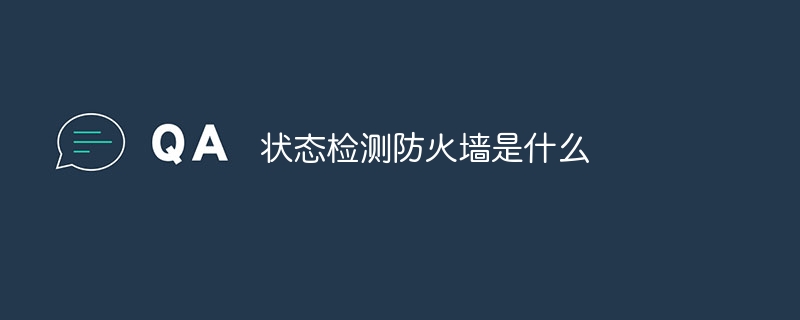Home >Common Problem >What is a stateful inspection firewall?
What is a stateful inspection firewall?
- zbtOriginal
- 2023-10-11 11:47:002178browse
Stateful inspection firewall is an important network security device that can help organizations protect their networks from unauthorized access and malicious attacks. Determine whether to allow or block data packets through the network by monitoring and analyzing the status and content of network traffic. Stateful inspection firewalls have functions such as access control, vulnerability detection, behavior analysis, logging, and auditing. Although it has some limitations, it is still an important part of network security and deserves the attention and adoption of organizations.

A stateful inspection firewall is a network security device used to monitor and manage network traffic to protect the network from unauthorized access and malicious attacks. It determines whether to allow or block data packets through the network by detecting and analyzing the status and content of network data packets. Stateful inspection firewalls are an important component of network security and can help organizations protect their networks from a variety of cyber threats.
Stateful inspection firewall monitors and analyzes network traffic based on network protocols and port numbers. It can detect the status of network connections, such as establishing, terminating, and maintaining connections. In addition, it can detect the contents of packets to determine whether they contain malicious code or attacks. Stateful inspection firewalls can determine whether to allow or block data packets through the network based on predefined security policies.
Stateful inspection firewall has the following main functions:
1. Access control: Stateful inspection firewalls can decide whether to allow or block specific network connections based on predefined access control policies. It can perform access control based on source IP address, destination IP address, port number and other information.
2. Vulnerability detection: Stateful inspection firewalls can detect vulnerabilities in network connections, such as unauthorized access, malicious code spread, etc. It can detect and block potential attacks based on predefined vulnerability signatures.
3. Behavioral analysis: Stateful inspection firewalls can detect abnormal network activities by analyzing the behavioral patterns of network traffic. It can identify abnormal traffic, abnormal connections, etc. in the network and take corresponding measures to prevent potential attacks.
4. Logging and auditing: Stateful inspection firewalls can record and audit network traffic information, including source IP address, destination IP address, port number, packet content, etc. These logs can be used for subsequent security analysis and investigation.
Although stateful inspection firewalls have many advantages, they also have some limitations. For example, it may be susceptible to new types of attacks because it can only detect known attack patterns. Additionally, it may have some impact on network performance as it requires in-depth analysis of network traffic.
In summary, a stateful inspection firewall is an important network security device that can help organizations protect their networks from unauthorized access and malicious attacks. It determines whether to allow or block data packets through the network by monitoring and analyzing the status and content of network traffic. Stateful inspection firewalls have functions such as access control, vulnerability detection, behavior analysis, logging, and auditing. Although it has some limitations, it is still an important part of cybersecurity and deserves attention and adoption by organizations .
The above is the detailed content of What is a stateful inspection firewall?. For more information, please follow other related articles on the PHP Chinese website!

